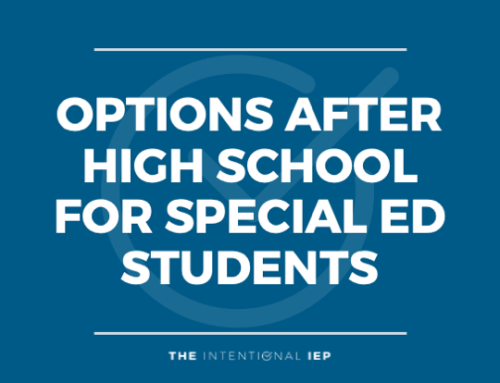Having a child with special needs – whether it be academic, physical, social, or emotional, can be challenging for families.
They are often faced with endless doctor appointments, specialist meetings, and calls with teachers and the school.
While it may be tempting to cast them in a bystander role when it comes to IEPs, that can be the worst thing to do.
So, what are parents’ rights when it comes to IEPs?
Parents’ Rights and IEPs

1 – Parents Have the Right to Participate in the IEP Process
Forget sidelining parents, the law gives parents full rights to participate in and make decisions about their child’s IEP. They must be invited to the meeting and can participate in decisions pertaining to their child’s education. The are legally considered part of the IEP team and must be included.
Here is a short snippet from one of the trainings inside of TII membership about involving parents in the IEP process:
If you are looking for more specifics on IEP’s like writing IEP goals and behavior plans – you’re in the right place!
You can join The Intentional IEP to gain access to over 150+ different IEP related trainings, and access to our IEP Goal Bank. Click the image above to join!
2 – Parents Have the Right to Invite Others to the IEP Meeting
Oftentimes parents come to meetings without support. They either are unaware of the fact or do not understand that they can legally bring an advocate with them. In some cases, teachers may actually want to encourage families to bring an advocate to make sure that their child gets the most appropriate setting and accommodations.
3 – Parents Have the Right to Decide Who Has Access to Their Child’s IEP
While there are key people who need access to a child’s IEP in order to provide services, parents have the right to confidentiality for their child and can determine who has access to the documents. This is important because it protects the child and, again, puts the parents in control of their child’s privacy and education.
4 – Parents Have the Right to Review Documents at Any Time
Parents always have the right to see and review any documents that are created about their child’s education. From evaluations to IEPs to progress notes, it is all available to parents at any point in their child’s school career. While the school may have guidelines about how the documents can be accessed in terms of hours when they are available for review, the district cannot keep parents from reviewing them or having a copy.
Provide your parents with a copy of the Procedural Safeguards At a Glance Resource to have access to during meetings. Join The Intentional IEP here, or by clicking the image above to get access.
5 – Parents Have the Final Say
All of the accommodations, modifications, goals, services, and recommendations for placement in an IEP are invalid until parents give their approval. This includes all large decisions, as well as smaller decisions that make an impact on the child’s education. Any formal changes in the IEP must have parental approval. Many parents are intimidated by the IEP process and simply do not understand that they do, in fact, have the final say in what the school does.
Helping parents understand their rights when it comes to the special education and IEP processes is important. Not only does it build trust, but it also helps ensure that the child in question gets the services and supports that he or she needs to succeed.






